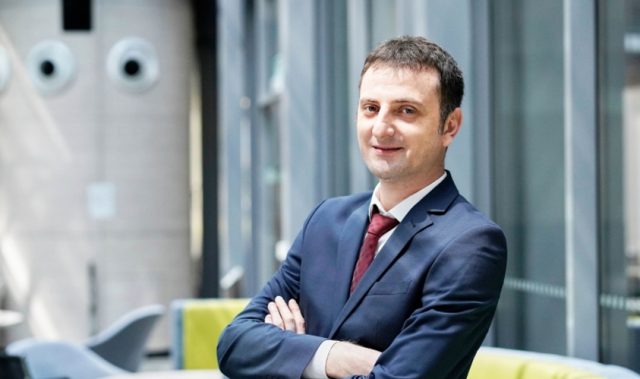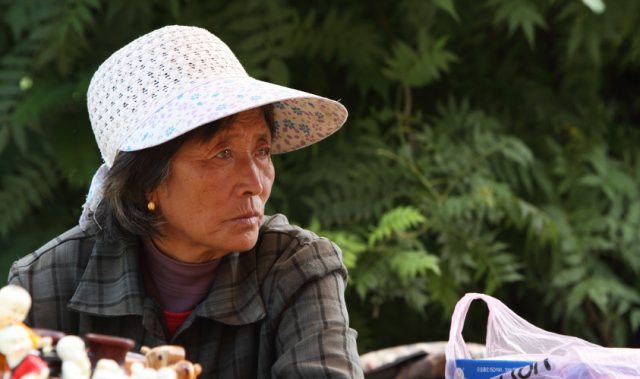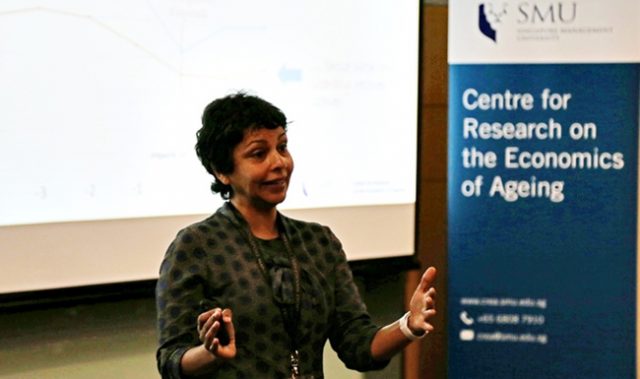
AsianScientist (Nov. 14, 2018) – By Sim Shuzhen – After building a career and raising children, many might envision their fifties and beyond as a period of stability, tapering off into a restful retirement. But real life is often less than rosy—unemployment, ill health, poor retirement preparedness and other ‘shocks’ may yet appear on the horizon to cast a shadow over this idyll.
Research aimed at understanding and cushioning such blows is of particular interest in Japan and Singapore, home to two of the world’s most rapidly ageing populations. At the Japan-Singapore Academic Forum on Ageing, hosted by Singapore Management University’s (SMU) Centre for Research on the Economics of Ageing (CREA) on 29 August 2018, researchers from the two countries gathered to discuss their work on multiple aspects of ageing, including health, wealth, employment and wellbeing.
Speakers at the Forum shared insights gleaned from two major surveys of older people: the Japanese Study of Ageing and Retirement (JSTAR) and the Singapore Life Panel® (SLP). The ongoing SLP-CREA’s flagship research project—is one of the largest population-representative monthly surveys in the world, offering researchers a rich source of data on more than 10,000 Singaporeans aged between 50-70 years.
Unsettled by unemployment
Data from the SLP revealed that over a survey period of nearly three years, some 13 percent of Singaporean respondents became unemployed for at least a month, said Dr Michael Hurd, senior research fellow at CREA and director of the RAND Centre for the Study of Ageing. While 39 percent of these people found new work within a month, a small minority stayed unemployed for up to two years in a single duration.
“As people get further out in the duration of unemployment, the chances of them becoming employed fall, causing this long tail of unemployment,” explained Dr Hurd.
Following unemployment, respondents’ household income plummeted, going as low as 30 percent of pre-unemployment levels for single people. Respondents also cut down significantly on expenditures, resulting in a 20 to 30 percent drop in spending.
“Think about your own situation in life—if you had to reduce spending by 20 percent, I think most people would find that painful. But that’s what unemployed people do,” said Dr Hurd.
Wealth, however, can provide some protection against income loss from unemployment. For both singles and married couples, respondents in the highest wealth quartile made much smaller cuts in spending than respondents in the lowest wealth quartile, said Dr Hurd.
“We see a buffering effect of wealth that mitigates the loss of income from unemployment on spending—wealth is doing what it should be doing.”
In addition to economic indicators, Dr Hurd also looked at the impact of unemployment on subjective wellbeing. While unemployment did not affect levels of satisfaction with health or social and family life, unemployed respondents reported large drops in satisfaction with their income and economic situation.
“The decline in income satisfaction that people experience when they’ve been unemployed for about a year is the same as the difference between people in the highest and lowest wealth quartiles. That’s a lot of movement in income satisfaction—it’s like going from the top of the wealth scale to the bottom,” explained Dr Hurd.
To their surprise, Dr Hurd and his colleagues found that unlike with spending, wealth does not have a buffering effect when it comes to income satisfaction. In fact, its effect is quite the contrary – people in the highest wealth quartile reported the largest decline by far in income satisfaction, while people in the lowest quartile reported only minor drops.
“This was a big surprise, but shows the importance of looking not just at income and spending, but also at measures of wellbeing,” said Dr Hurd.
Adapting to adversity
Besides unemployment, health shocks—the new diagnosis of a major chronic condition—can also negatively impact subjective wellbeing, said Dr Terence Cheng, affiliate member at CREA and senior lecturer at the University of Adelaide’s School of Economics.
SLP respondents diagnosed with heart attack, stroke or cancer reported large declines in satisfaction with life and health, said Dr Cheng. While the dip was greatest at the time of diagnosis, health satisfaction levels remained depressed for months after, only returning to baseline some 11 to 12 months post-diagnosis. Life satisfaction levels, on the other hand, recovered faster, returning to baseline six months post-diagnosis.
It also matters which medical condition one is diagnosed with—respondents diagnosed with cancer experienced much greater and more persistent drops in health satisfaction than respondents who had heart attacks, said Dr Cheng.
Just as wealth buffers the economic impact of unemployment, what factors may help people adapt to a chronic diagnosis? In his presentation, Dr Cheng focused on whether or not private health insurance can help people cope with declines in life satisfaction following a health shock. He and his colleagues found that life and health satisfaction levels of respondents with private health insurance recovered faster than those of respondents without it, a difference that was not seen with long-term care insurance, said Dr Cheng.
Further, as compared to respondents without private health insurance, respondents with private health insurance spent more on healthcare at the beginning of their illness, but less further down the road.
“This may suggest that what is driving this differential recovery is that individuals are front-loading their treatment, possibly completing their course of treatment faster than individuals without private health insurance,” said Dr Cheng.
His work on health shocks takes its cue from the growing body of evidence in economics showing that humans have the ability to bounce back from adverse life events, said Dr Cheng.
“Increasingly, there are calls for research to understand the process of adaptation, with the aim of incorporating these findings into conventional economic theory; the hope is that we can then use this understanding to design, appraise and evaluate policies,” he said.
Asian Scientist Magazine is a media partner of the Singapore Management University Office of Research & Tech Transfer.
———
Copyright: SMU Office of Research & Tech Transfer. Read the original article here; Photo: Sim Shuzhen/SMU.
Disclaimer: This article does not necessarily reflect the views of AsianScientist or its staff.












